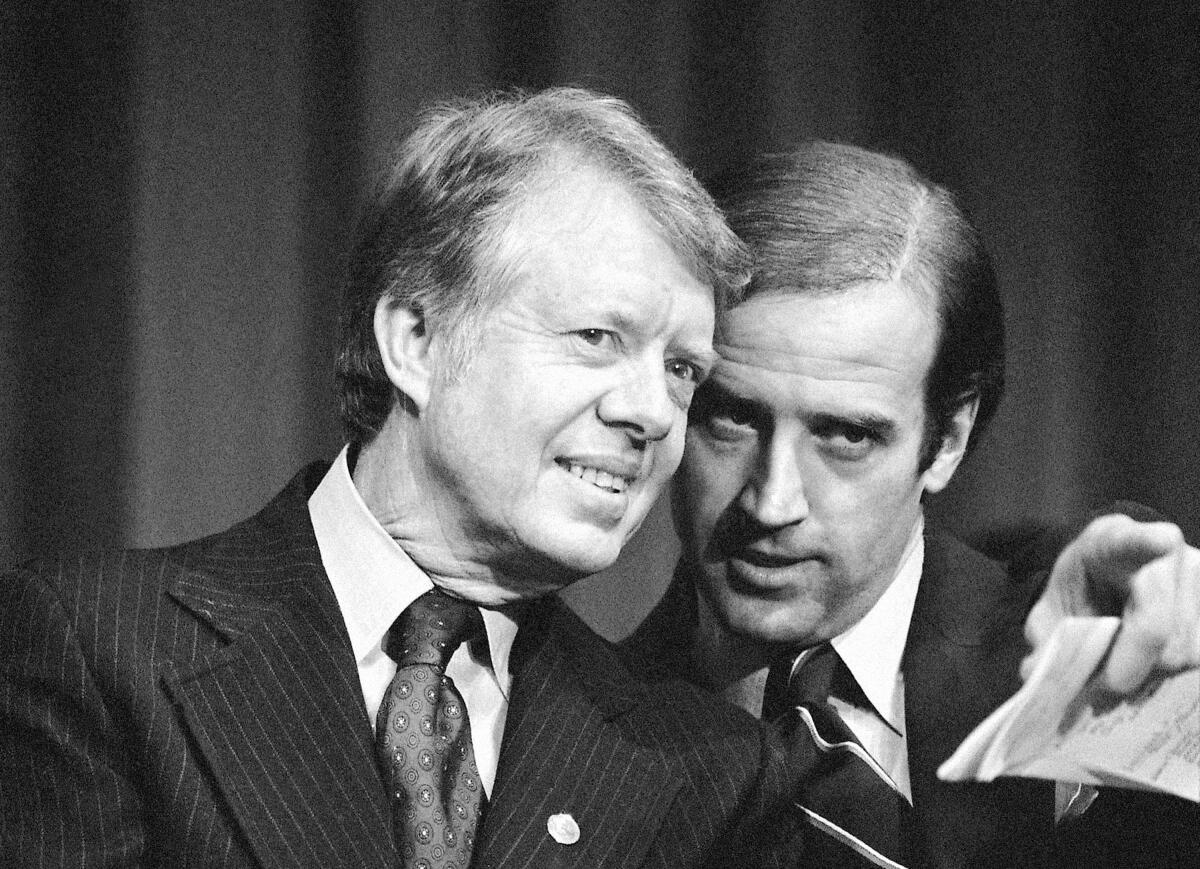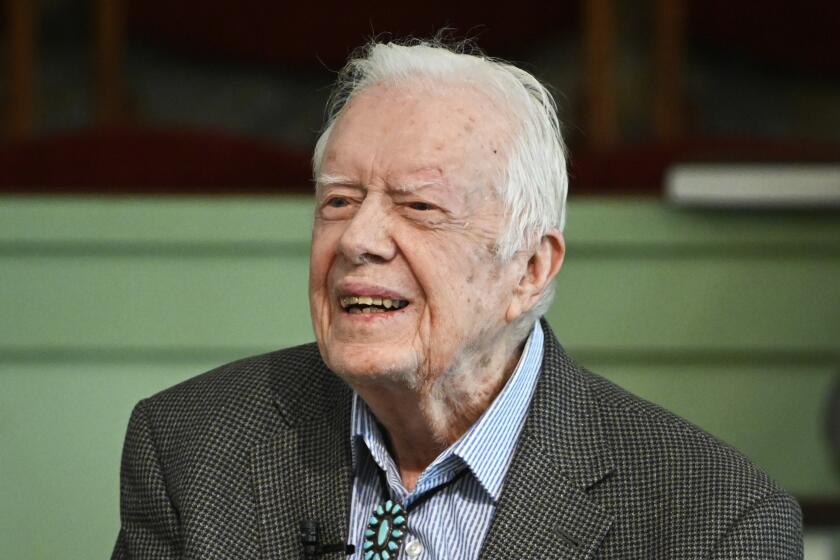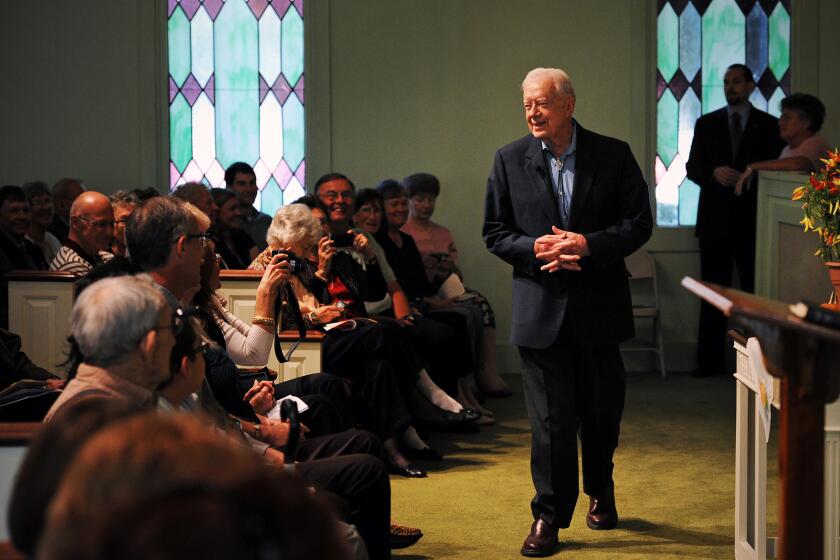Column: He’s in hospice care now. But Jimmy Carter is still changing the world

- Share via
I badly wanted to cast my first presidential ballot for Jimmy Carter in 1976, but I wasn’t old enough to vote.
I turned 18 four days days after the election. Carter was 52. Today, nearly five decades later, I’m in my 60s and he’s 98. The Carter Center announced last week that he was entering hospice care and would forgo further medical treatment for his various ailments, choosing to spend his remaining days at home with his family.
Even all these years later, I remain impressed by Carter, and especially by the staunch and stoic way he has allowed his moral compass to guide his life.
For me, that was never clearer than when he did his best to apply his deeply held values to the rough, tumble and darkly cynical world of foreign policy.
Opinion Columnist
Nicholas Goldberg
Nicholas Goldberg served 11 years as editor of the editorial page and is a former editor of the Op-Ed page and Sunday Opinion section.
Carter was elected president at a transitional moment in U.S. history, just after the end of the Vietnam War, and just a few months after the oversight committee led by Sen. Frank Church (D-Idaho) issued its final report on, among other things, American attempts to assassinate foreign leaders and to spy on American protest movements. Carter came to office in the wake of U.S. meddling in Chile that contributed to the overthrow of democratically elected President Salvador Allende.
In those days, much of the U.S. foreign policy establishment was in the grips of a kind of Cold War realpolitik that held that ugly moral compromises had to be made in the interest of the bigger ideological struggle against our communist adversaries in Moscow.
The mere idea of allowing your values to help shape your strategic calculations was dismissed by many as idealistic and naive. To the foreign policy titans of that era, notably Henry Kissinger, vital national interests, great power rivalry and so-called realism ruled the day — not justice, decency or do-goodism.
That’s why, for years, the U.S. had cut distasteful deals with unsavory dictators from the shah of Iran to Presidents Anastasio Somoza in Nicaragua and Ferdinand Marcos in the Philippines. It was a gray, murky world our strategists saw around them, divided into allies and adversaries, with our friends often considered to be not much more than lesser evils. Idealism was seen as a sucker’s game.
The 98-year-old former president has decided to spend his time at home with family instead of receiving “additional medical intervention,” the Carter Center said.
Carter came to office rejecting that, and promising to put a new priority on morality and human rights.
“For too many years we’ve been willing to adopt the flawed and erroneous principles and tactics of our adversaries, sometimes abandoning our own values for theirs,” he said in May 1977 at Notre Dame University. “We’ve fought fire with fire, never thinking that fire is sometimes best quenched with water. This approach failed.”
Carter’s rhetoric still resonates today, when Saudi Arabia is back in our good graces despite having killed and dismembered a Washington Post journalist, when we have to decide how to respond to China’s treatment of its Uyghur minority and to alleged Russian war crimes across Ukraine.
Carter took steps to match his words. It was he who elevated activist Patricia Derian to assistant secretary of State for human rights, where she began tracking the human rights abuses of countries around the world. Carter publicly supported dissidents in the Soviet Union such as physicist Andrei Sakharov and refusenik Nathan Sharansky. He put Latin American dictators and others on notice that the U.S. would no longer blindly tolerate their human rights abuses in return for their support against Moscow.
Jimmy Carter was a shrewd and sometimes ruthless politician until he was elected president. Then he changed his style.
During his presidency, Carter cut military or economic aid or both to Somoza’s government and to the governments of Chile, El Salvador and Uganda, to protest human rights abuses.
Carter’s policies showed mixed results. For one thing, his focus on human rights was selective and not always consistent. Carter, for all his moral scruples and religious principles, understood (or perhaps came to realize) that there was a role for compromise.
As secretary of State Cyrus Vance put it, the administration had decided to “speak frankly about injustice” when it was “constructive to do so.”
For instance, Carter toned down his human rights criticism of Russia after it threatened to pull out of arms control talks, according to Robert A. Strong, a professor of politics at Washington and Lee University. Was that a necessary trade-off? Very possibly.
Unfortunately, near the end of his term, he also cut references to “disappearances” in his Human Rights Day proclamation, notes historian and journalist Jonathan Alter in his biography of Carter, “His Very Best.” He tolerated Marcos in the Philippines. He “scaled back” his calls for human rights in his speeches.
In his push to prioritize human rights, Carter often found himself battling hawkish, old-school colleagues such as National Security Advisor Zbigniew Brzezinski, who found the president’s emphasis on “decency” naive and viewed human rights more as a useful propaganda tool than as an actual priority.
A new documentary, “Jimmy Carter: Rock & Roll President,” examines the former POTUS’ relationships with icons such as Willie Nelson, Bob Dylan and Gregg Allman.
Still, on balance and despite the shortcomings, Carter did the world an enormous service in working to reset the balance between values and hard-nosed cynicism in foreign policy.
“His bigger point was that the traditional tension between idealism and realism — morality versus power — was a false choice,” wrote Alter, who argues that Carter’s human rights policies had lasting influence.
Even after the more hawkish Ronald Reagan came into office in 1980, Carter’s concept of human rights “became permanently encoded in the global conversation,” wrote Alter.
Of course, foreign policy remains a world of compromise, nuance and trade-offs, of balancing what’s right with what’s necessary, and it undoubtedly will stay that way.
But I believe, as Carter did, that the U.S. needs a strong, consistent moral foundation in which to ground its foreign policy decisions, as well as constant reminders about why that foundation matters.
Jimmy Carter taught us a lesson about American power and its misuse, and did his best where possible to reject the shortsighted, hypocritical calculations that far too often made us — and make us — complicit in human rights and other violations.
More to Read
A cure for the common opinion
Get thought-provoking perspectives with our weekly newsletter.
You may occasionally receive promotional content from the Los Angeles Times.











